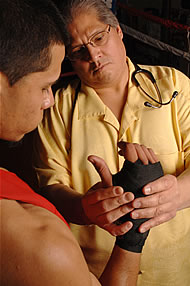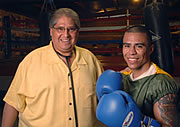 |
|||||||||||||||||

More photos from Ramos Boxing Team gym
The Fight Doctor
|
Ruben Tenorio ('77) has boxing in his blood. As a child, Tenorio attended the annual Golden Gloves state tournament with his father and
uncle, both former boxers. And Tenorio remembers gathering around the radio with his family to He learned early on, however, that his place in the boxing ring was not as a fighter. He quit the sport after a few youth matches. "I didn't like getting hit in the head," he says. Role models
Tenorio doesn't dish out or absorb blows anymore. Instead, he is responsible for ensuring the safety of boxers as a team physician for USA Boxing, a nonprofit organization that oversees the development and promotion of Olympic-style boxing in the United States. A family-practice physician in his hometown of San Antonio, Tenorio travels the globe as a fight doctor at worldclass amateur boxing events. The volunteer position allows him to serve as a mentor to young boxers, many of whom come from difficult circumstances similar to those Tenorio faced growing up in east San Antonio. "We act as role models," Tenorio says. "If you look at the participants in amateur boxing, most of them are underprivileged kids. It's a solitary sport that requires hard work and discipline. We're trying to help give them the edge to take on whatever situation they're in." Traveling the globe Tenorio got his start in 1989 working local amateur bouts in South Texas as a fight doctor — a ringside physician who assesses the physical condition of boxers and has the authority to end a match if he feels a fighter's safety is endangered. He soon caught the attention of USA Boxing officials and was selected to serve as ringside physician at the 1993 USA Boxing National Championships in Colorado Springs, Colo.
He continued to work USA Boxing events across the nation and since 2001 has served as the team physician for USA Boxing international events, including World Cup matches in Denmark and Russia, the Women's World Championship in Turkey and competitions in Ireland and Mexico. As team physician, in addition to serving as a fight doctor during matches, he treats fighters' injuries between bouts, ensures they have access to adequate emergency medical care and looks after their overall wellness. "When Ruben travels, the team manager always raves about the extra time he spends with the boxers," says Armando Sanchez of Milwaukee, former medical committee chair of USA Boxing. "The boxers know that Ruben and other physicians are volunteering their time. And they look up to him." In the neighborhood Michael Tenorio ('78), Ruben Tenorio's cousin and former He recalls being shocked when Tenorio, a 1982 graduate of the Michigan State University College of Osteopathic Medicine, finished his residency at a Detroit hospital and decided to move back to San Antonio to open a practice in a neighborhood where Spanish was the predominant language and much of his patient base was poor and lacked medical insurance. "I asked him why he was doing this, and he said he wanted to give back," Michael says. "I thought about it for a moment and realized that's great. He could've taken a different job, but he decided he wanted to help out in his community." Tenorio, who learned Spanish as a second language, had to adjust to speaking only Spanish. He also had to determine how to treat the needs of a diverse clientele that includes immigrants from Mexico, Spain, Ecuador, Colombia, Puerto Rico, Cuba and the Dominican Republic, as well as Texas natives. His background, though, gave him a special bond with his patients. "I was born of that kind of neighborhood," he says. At North Texas Becoming a doctor wasn't in Tenorio's plans when he first came to North Texas. But after a trip to the counseling and testing center to explore his options, and with encouragement from his Clark Hall resident assistant, he changed his major to biology and entered the pre-med program. "My R.A., Ken Woolridge ('76), was also in pre-med," Tenorio says. "He was my role model and encouraged me to pursue the program. He kind of coached me and told me I could do it." Tenorio also remembers many faculty members who helped him along the way, including his freshman biology professor, J.K.G. Silvey; his pre-med adviser, David Redden ('46, '49 M.S.); and his English professor, James Linebarger. "North Texas prepared me well for medical school. I don't think there was a professor or a department there that accepted mediocrity from students," he says. Success stories Today Tenorio is a widely respected expert in cutting-edge But business success has never been Tenorio's driving force. It takes something other than money to repay those who helped him succeed in life, he says. "A lot of physicians never give back," he says. "Just because you spend $40,000 a year for your education, you didn't pay for your whole education. Taxpayers paid for the majority of it. So you've got to be active in your community." What Tenorio says he's most proud of — and what he emphasizes to his young boxers and patients back home — are the success stories he's been a part of through his affiliation with USA Boxing. Professional world champion Floyd Mayweather Jr., a tough skinny kid when Tenorio first met him, is one of many boxers Tenorio has seen grow into a responsible adult. And there are countless others who didn't achieve fame as fighters but used the sport as a springboard into a better life, free of the traps of drugs, crime and poverty that ensnared many of their peers. Tenorio's lifelong passion for boxing is having a far-reaching impact. That's why you'll find him ringside anywhere from Bexar County to Bangkok. "You have to do this because you really like it," he says. "You have to be committed to the cause."
|
||||||||||||||||||||||||||||

